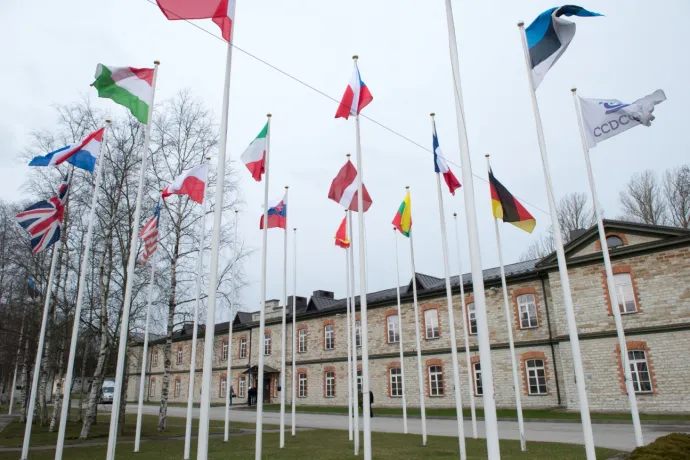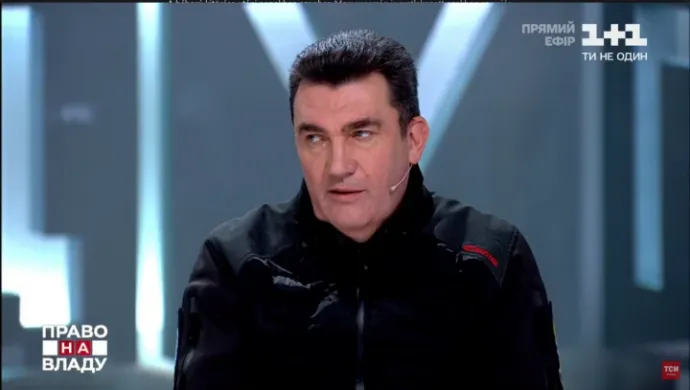Hungarian government blocked Ukraine's accession to NATO cyber centre until war, now it would approve it

Despite Russia's desire to the contrary, the outbreak of the Russian-Ukrainian war in February last year has proven to be a catalyst for Ukraine's Western integration and for the enlargement of NATO: since it was attacked, Ukraine has been pressing for closer ties with the West, while two countries that had been militarily neutral, Sweden and Finland, have applied to join NATO. The latter has been awaiting approval only from Turkey and Hungary, which has been a long time coming. Hungary has been blocking Ukraine's integration into the Western bloc for years, a less spectacular element of which was its refusal to allow Ukraine to join NATO's cyber centre.
However, after the outbreak of the war, the Hungarian government quietly abandoned its previous veto on this issue and it now supports Ukrainian accession in principle.
Ukraine has been trying to join the Cooperative Cyber Defence Centre of Excellence (CCDCOE), which is part of NATO but organisationally separate from it, for a year and a half. Initially, the Hungarian veto prevented the move, but in March last year Hungary gave its consent to the request. However, as is the case with NATO, each member state must sign the accession agreement individually, and this is still ongoing. The Hungarian government told Telex that preparations for this are already underway – but in light of the Finnish and Swedish NATO accession approvals' repeated delay, when this would be done is still a question.
Cyber Defence Centre: Is it NATO or isn’t it?
Although the name CCDCOE itself indicates that it is NATO's cyber defence centre, it is not limited to NATO member states.
NATO has established several such centres. Their mission is to facilitate cooperation, information exchange and the enhancement of capabilities among member states – NATO members and partners – in their respective fields. To this end, they develop guidelines, conduct research and organise trainings and exercises. On the other hand, these organizations are not part of NATO's command structure and are not directly funded by NATO, they are funded by the member countries themselves. 28 such centres operate under NATO, each focusing on a narrow field of expertise and each with a different headquarters in a different country. For example the Military Medical Centre of Excellence (MILMED COE) in Budapest, Hungary has a Hungarian director.
The cyber centre was founded in 2008 on an Estonian initiative, its creation having been catalysed by the 2007 Russia-linked online attacks on several Estonian government agencies, banks and media companies during the riots over the removal of the Soviet memorial in Tallinn. This was the first time a country had been so blatantly attacked online by a foreign power. Hungary became the eighth member of the CCDCOE in 2010, the first to join the seven founding members. The organisation has been growing ever since.
The CCDCOE is headquartered in the Estonian capital Tallinn and its director since August last year has been the Estonian Mart Noorma. The organization has 29 funding members (the 30 NATO member states, minus North Macedonia), which must be NATO members and which can vote in the organisation's governing committee, for example on the admission of new members. There are also nine other contributing partners, one of which is Ukraine, which is already listed on the organisation's website, although it is still in the process of joining (the others are Austria, Finland, South Korea, Sweden, Switzerland, Ireland and Japan).
Ukraine joining the CCDCOE is good for the organizaton, because Ukraine has been the most frequent target of Russian cyber attacks since the years preceding the war, and since then it has gained considerable experience in this field, which it can share with other member countries. Ukraine, on the other hand, benefits from being a member of the community by having access to the latest information and effective assistance from other member states in strengthening its defences.
And, of course, accession could be an important step in the country's integration towards the West. It is not, of course, on a par with Ukraine's membership in NATO, which has been a focal point in the Russia-Ukraine conflict, but it is the first formalised cooperation between a NATO-linked organisation and Ukraine. This was explicitly what Nataliya Tkachuk, the Head of Information and Cyber Security of the National Security and Defence Council of Ukraine was referring to, when she said that CCDCOE membership is an important step on Ukraine's path to NATO membership.
The Hungarian government vetoed all the way to the outbreak of the war
Ukraine first applied for membership in the Cyber Defence Centre in August 2021 and the process of approving the application for membership began in October 2021. However, members must unanimously support admission, and last year, according to news reports, the Hungarian government did not do so until the outbreak of war. However, with the outbreak of war – and the intensification of Russian cyber-attacks – the issue of the cyber centre has presumably become more prominent.
To date, no official information has been released by either side as to which member state had blocked Ukraine's accession, but all indications suggest it was Hungary. According to the Ukrainian news agency UNIAN, Oleksiy Danilov, the secretary of the Ukrainian National Security and Defence Council, said on a TV programme in early February last year that only one member country had blocked their accession to the cyber centre: "There is an institution called Cyber-NATO. And last summer we submitted the relevant documents to it, and we passed all the relevant checks. And there, as in NATO, decisions are taken by consensus. One European country refused to allow us to be part of this prestigious institution.
This is an EU country, these are our neighbours. They denied us this opportunity. Of all the countries in the alliance, just one is against it."
It is relatively clear who is involved just from the fact that it is an EU member state and a neighbour of Ukraine, but a source involved in the process had actually confirmed to the Ukrainian newspaper European Pravda that Danilov was referring to Hungary. (We contacted the CCDCOE last week with several questions, but they would not comment on the previous Hungarian veto.)

It was also last year, in early February, just weeks before the outbreak of the war that Azonnali wrote about the Hungarian blocking of Ukraine's CCDCOE accession. According to the information of the since defunct newspaper, at the December 2021 EU summit, the Estonian Prime Minister personally tried to convince Prime Minister Viktor Orbán to drop the veto – without success. Then, in early January 2022, the Estonian State Secretary for Foreign Affairs held talks with Ambassador Kristóf Forrai in Tallinn, and according to Azonnali, the reason why Hungary was blocking Ukraine's application for membership was also discussed.
In early February, at a meeting of the European Parliament's Foreign Affairs Committee, German Christian Democrat MEP Michael Gahler told Fidesz MEP Balázs Hidvéghi to "take home the message that the Hungarian government should stop blocking Ukraine's accession to the CCDCOE", because "not every issue can be linked solely and exclusively to the Hungarian minority".
Hungary has been hampering Ukraine's integration with the West since 2017, because the Hungarian government believes that the Ukrainian education law adopted that year and the language law adopted two years later discriminate against Hungarians in Ukraine. It's in response to this that the Hungarian government has blocked dialogue at the highest level between Ukraine and NATO in recent years, even if not preventing but slowing down the rapprochement. Even a month before the war, at the end of January 2022, Foreign Minister Péter Szijjártó told the Russian news agency TASZSZ that Ukraine would have to make serious changes if it wanted Euro-Atlantic integration.
In the days after the war broke out, however, Hungary joined the ranks of EU countries that declared their support for Ukraine's EU accession – and while this was not widely publicised, the veto was withdrawn in the case of the cyber centre.
This allowed the organisation to formally accept Ukraine's application for membership, which had previously been blocked for more than six months.
In March 2022, the funding members unanimously supported Ukraine's admission as a Contributing Participant, a quasi-external member. This process has been ongoing since then: in January 2023, the Ukrainians signed the technical agreement on accession, which must be signed by the funding members one by one.
The government says preparations are under way
At the end of January, we wrote to the Prime Minister's Office, the Ministry of Foreign Affairs and Trade, the Prime Minister's Office and to government spokeswoman Alexandra Szentkirályi to ask when Hungary expects to sign the accession agreement, but we received no reply. We asked the same question at a government briefing at the end of February, but Minister at the Prime Minister's Office, Gergely Gulyás said he did not know the answer. Then, an unusual thing happened: almost a week after the government briefing, the government itself sent us the answer to our previously ignored question:
"In response to your question at the Cabinet briefing, the Press Office of the Prime Minister's Office is sending the following reply. The legal codification regarding UKR KIBER COE has been completed. The preparatory work is currently underway, after which the representative of Hungary will be able to sign the technical agreement."
We have also contacted the CCDCOE with our questions. Among other things, we wanted to know the status of the approval of Ukraine's application for accession. "The signing process is progressing well, we are about half way through, but we cannot estimate exactly when all the signatures would be collected. In some cases it has taken a year, in other cases a couple of years, because the bureaucratic procedures vary a lot between the donor nations. Unfortunately, I cannot comment on exactly who has already signed/not yet signed the agreement," the representative of the Cyber Center wrote.
For more quick, accurate and impartial news from and about Hungary, subscribe to the Telex English newsletter!
And since you're here, we invite you to be a part of shaping Telex English! Take a few minutes to fill out our anonymous survey, and tell us what you think about Telex English and how it could be even better!